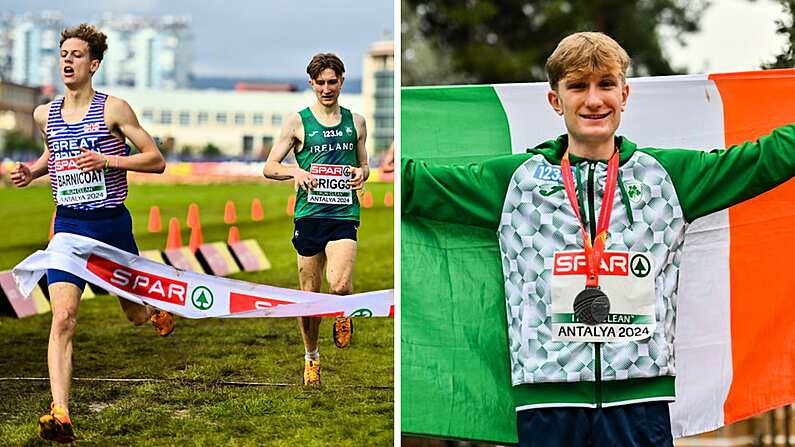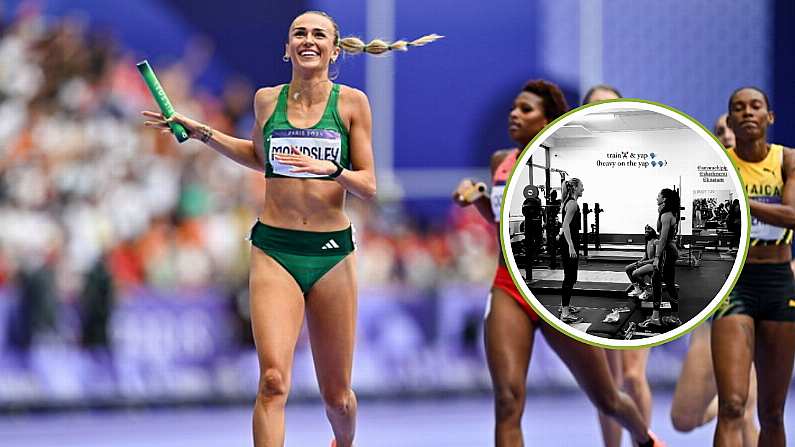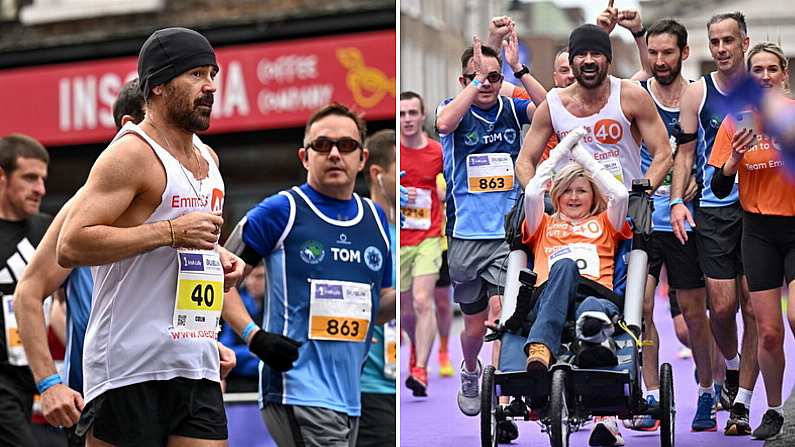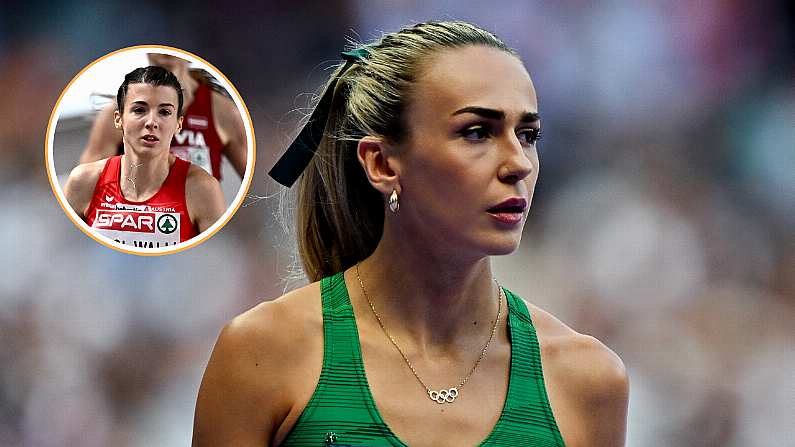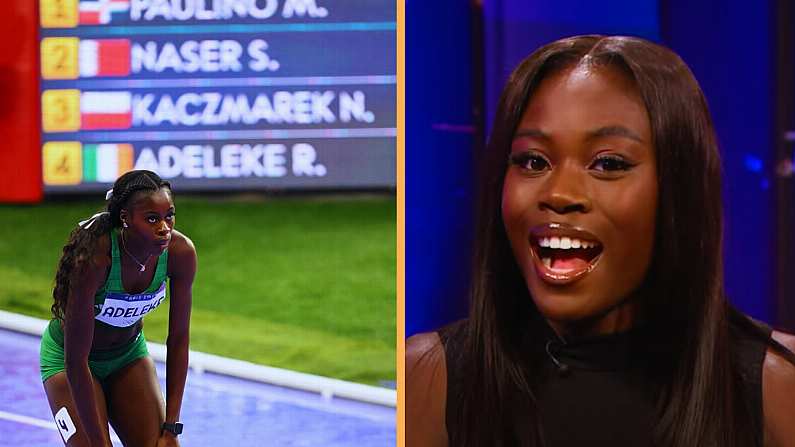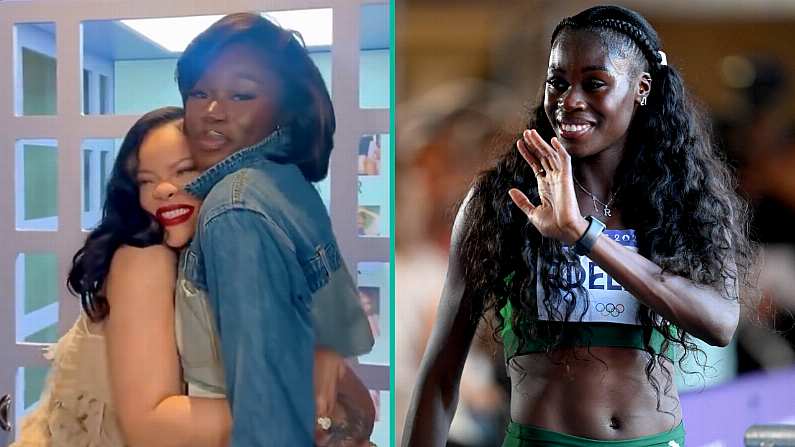Jim Davis had a long-term plan for Danny Darcy. The aim wasn’t to make him a great junior athlete but a great senior one. He had seen many young talents running with their foot to the floor too early in their careers and he wasn't going to allow that happen with Darcy.
They were on their way too, both ambitious and fully bought into their partnership on the B of the starter’s bang from the moment they joined forces in February 2004.
Just 17 months later, there flashed a bright neon sign of the Carlow teenager’s talent when he finished second in the 1500m at the European U20 Championships - he was still a fortnight away from turning 19.
Tragically, that summer saw the final full track season of Darcy’s athletics career. The beginning of the end came the following spring when he developed an injury for which there was no fix.
A decade later, long gone from competitive athletics, Darcy would face another battle: one for his life.
* * * * *
It was a Leinster Cross Country Championship U12 race when Darcy’s ability was first sighted. Inexperienced and having no concept of distance and pace, he took off. He finished second and thought there might be more to it than having to spend a cold winter’s day in a muddy field.
There soon followed appearances on Irish schools teams. The kid from Bagenalstown was hugely successful underage, even more so on the track than on the grass, winning All-Ireland schools middle distance titles at junior, intermediate and senior grades.
There was a brief period in his mid-teens when his attention was not fully on running but that changed when he failed to qualify for the European Youth Olympics. His pride hurt, Darcy increased his efforts, reading what he could and training himself.
Davis, who was the Athletics Ireland National Endurance Director at the time, soon arrived to help.
“He had huge potential from watching him on squad days,” says Davis.
“When I heard he was coaching himself, I just said he’s going to be lost to the sport. I just casually said that if you ever need a bit of help, give me a shout.
“Within a couple of days, he rang me and asked would I be interested in coaching him.”
Three months into their partnership and Darcy’s 800m personal best had already tumbled three seconds to 1:54.
He qualified for the 1500m at the 2004 World Junior Championships in Grosseto but exited in the heats. It was disappointing but also a learning experience. In a phone call with his coach soon after the race, Darcy was told by Davis he would win a medal at the following year’s European juniors. And so he did.
“You were in the warm-up area, you were looking at guys and they had different gear on them,” says Darcy of that trip to Italy.
You just start looking at these guys as if they’re gods. You’re in awe at your first championships.
The following year, when I went to the European Championships, I’d run leading times in Europe. I was ranked second or third going in. I had confidence going in there.
I was in the warm-up area and wasn’t looking around me at what the shot putter in the corner was putting on him or what the Ukrainian looked like.
He felt like he belonged.
Sometime later, Darcy gave a speech to a youth development squad where he preached the need for that belief.
“The one thing I said to them was that ‘I realised they only had two arms and two legs and I had a right to be there - I’d qualified’.
“Amazing things happen at championships all the time, you have to go in there with confidence that you can compete.
“Maybe this is an Irish thing but people would have seen ourselves as not having a chance. You need to give yourself a chance because sometimes you can have yourself beaten before you go out.”
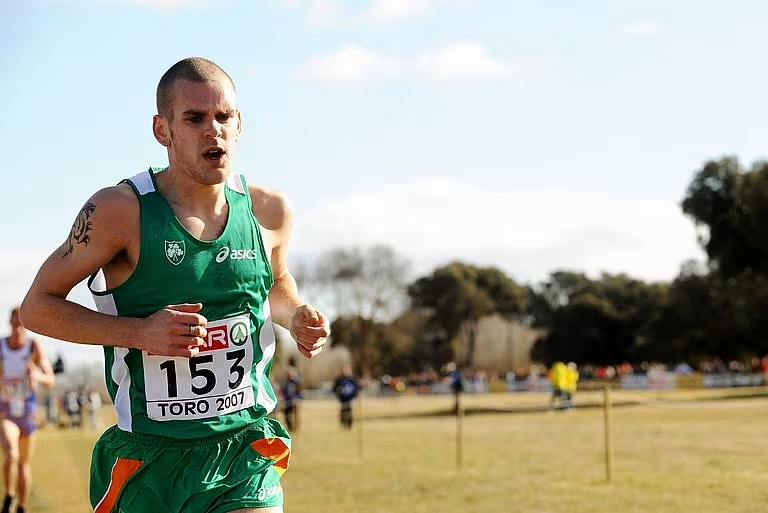
Danny Darcy in action during the Under 23 Men's race at the 2007 European Cross Country Championships. Picture credit; Stephen McCarthy / SPORTSFILE
For the year building up to the Euro juniors, Davis set up championship scenarios for Darcy. They ran on consecutive days with the concept being the first day was the heat and the second the final.
“I once had a complaint when he won the Leinster Schools,” says Davis.
“The first lap was 72 or 73 seconds - slow. He threw in a 58-second lap and blew everybody away.
“Afterwards a certain individual said to me, ‘Danny could have broken Eamonn Coghlan’s record’. I said, ‘Well, lookit, this is championship running and Danny is going to the European juniors in a month’s time and we’re trying to gear him up for that’."
A month prior to those championships in Lithuania, he ran 3:44.11 for 1500m at a British Milers Club B-race in Solihull. To this day, it remains his personal best.
“Going to the Europeans, I expected that he would be there or thereabout if he ran the race to suit himself, which he did,” says Davis.
Danny was a very brave runner. He used to go from the gun.
In the final, he was a bit concerned about one or two who were faster than him. I said, ‘Don't worry about these Russians or anyone else. You run to suit you and if they can go with you, fine, if someone goes with you and takes you, you’ve given it your best shot’.
A lot of athletes run around when they get to finals - even seniors you see it - they get outfoxed in a slow time down the home straight. They don’t run to their full potential. I always thought that athletes should run the race to suit themselves.
Danny’s best way was to go from the gun. When I said that to him that morning of the race, he said, ‘That’s great. I’m delighted you want to do that. I thought that you might be afraid’.
That race is remarkable from an Irish perspective as not only did we win silver, but also gold. In a tight battle, one of Darcy’s great rivals, Colin Costello from Meath, took the glory.
“In the final, the hope was that somebody would take it on for a lap, go through a lap in 60 seconds and then I was going to hit the front,” says Darcy.
“I was confident if that happened, it was a way to beat Colin Costello.
“We were 100m in and we were fanned across the track. There were lads looking at each other. We were going through the 100m in 20 seconds. I hit the front. Colin Costello was sitting at the back at the time.
“We have it on video and we laugh about it: when he realised that I was in the front going through 300m, panic hit because he could see he was the length of the field behind. The panic button was hit, he jumps out. It was a two-man race after 300m.
“It was a great day and it is a fond memory. We just tore them asunder, led them a merry dance. At 300m, 250m to go, he came and pushed past me. I responded but it was deja vu.
“Costello, to be fair to him, he had a phenomenal kick. I’d never seen or raced anything like it, on the continent or anywhere else. He’s tough. It was always me and him one on one.
“We had a plan but we just needed someone else to do it. I needed a teammate to pull me through.
“If you said to me that Colin beats me and I come second, would I take it? Absolutely. I would have taken any medal.”
Little did Darcy realise that he had hit the peak of his athletics career. Stretched out in front of him, he could see taller summits to be climbed but he would never get past base camp again.
After leaving Kaunas, Darcy travelled back home to Ireland, spent a night at a friend’s house in Dublin and then headed off on a Leaving Cert holiday to Magaluf. That was the end of his final proper track season.
“There were a couple of the newspapers in Dublin to see us come home,” recalls Darcy.
“We weren’t celebrities by any means - athletics is not a sexy sport.
“My friends supported me but they had no interest. They knew I'd won a medal but I was over there as an 18-year-old in Spain and they didn’t give a shite, that’s the truth - they didn’t bat an eyelid.
“I’m lucky that I was raised that way too. You wouldn’t be let get that far ahead of yourself.
“There was nothing amazing about it, it was just another day in Bagenalstown when I got home!”
* * * * *
I was throwing everything into it. I was addicted to it. It was everything that I was going to do. I never really cared about school, never really thought about doing any work.
- Danny Darcy
The ordeal began in March 2006, when Darcy experienced the first pangs of Achilles tendinitis. At that stage, he was nearing the end of his first year at DCU where he was studying Business on an athletics scholarship.
That the teenage prodigy, a home bird, would attend DCU was an inevitability once they came calling but he had not been without options.
Providence College, where John Treacy had starred 30 years early, were suitors. John's brother Ray was the Director of Cross Country and Track and had been in contact. There was also correspondence with Iona College in New York but he was never going to fly the coop.
"I definitely considered it but it wasn’t for me," says Darcy.
When I subjectively stripped that away, career-wise, there was nothing there which wasn’t here. I had my coach, we were running faster than ever. We were lining up to take on the world, as you feel you’re going to.
I was sponsored by Nike at the time, you have to give that up if you go over there. Your college degree, you don’t know what you’re going to get.
In the spring, Darcy began to feel pain but kept training in the misguided hope it would simply go away. He ran the varsity championships, beating the older David Campbell in the 1500m.
"I was running on two legs that I shouldn’t have been running on," he recalls.
"Tendinitis is not something which goes away, as I found out. It’s constant pain.
"In the morning, I would have to sit on the end of the bed for a couple of minutes, you’d be turning your ankles over warming them up because if you stood out of the bed, they would be so stiff - really sore to pinch.
"It was after that race I said, ‘This isn’t right’.
"I was off all summer, started again fresh in the autumn. I was kind of OK on the soft ground throughout the year doing cross country.
"Come April as soon as I started to turn over a bit quicker again on the track, the tendinitis came on again for a second spell."

17 November 2007; Danny Darcy, DCU A.C, in action during the IUAA Road Relays. Picture credit: Tomas Greally / SPORTSFILE
Darcy visited the renowned Ger Hartmann in Limerick and went to Belgium in hope of finding a solution. "You name it, I was there," he says.
"I had six different pairs of orthotics. All I was doing was resting, a bit of pool training, on the bike. I stayed off it for the whole summer, so I missed a second [track] season in a row."
Through that period, one which must have been tough for someone so young to have the handbrake pulled up on their talent, Darcy showed remarkable resolve.
"It was just, ‘Nah, it’s a hump in the road’.
"I was in the pool and I was doing jogging for an hour with the waterbelt on me, bored out of my tree in a pool not moving with old ladies swimming around you.
"I could put up with boredom for a long time. I just had an ability to switch off and get the job done. I could see the progress, take the positives from it."
Through the first two years of the injury, Darcy was still a carded athlete receiving funding from Athletics Ireland. They also paid for doctors and physios and got him those appointments with Ger Hartmann.
"I can’t say I didn’t get the support - they did everything they could," says Darcy.
"The carding went but I couldn’t turn around and say that I was hard done by - I hadn’t been running the times, I hadn’t hit the standards."
Though there was pain and an uncompromising injury, the decision to hang up his spikes did not come easily.
In his final year at DCU, the winter went well and he trained consistently. Fellow Carlow man and physical therapist Star Geoghegan (who has worked with Usain Bolt in the past) was helping.
“We were managing it for a while,” tells Darcy.
“I was seeing Star twice a day, two or three times a week. He was maintaining me more than fixing anything for me. He was doing what he could but that wasn’t sustainable.”
He ran a couple of indoor races and won the varsities championship thinking he'd kick on from there but those buds of hope never bloomed.
College finished and he moved back home to Carlow, did the odd bit of substitute teaching while hanging onto the final threads of his career.
“I got him into the Great North Cross Country - a televised race,” recalls Davis.
They had a short, 4km cross country race in Newcastle.
Everything going along fine. He was to fly out on the Friday and race on the Saturday. I phoned him up as I did every Monday to give him the schedule day by day for the week and he said to me, ‘I’m not going any more. I’m not running any more’.
I thought he was winding me up. He’d wind me up and I’d wind him up - that was the relationship, we had a bit of fun.
I told him to think about it. I had a long conversation with him for an hour and a half.
I went down to Bagenalstown on the Friday. I knew when I met him that the body language wasn’t right.
He just said to me that he wasn’t going to do it any more. I didn’t put pressure on him because I thought, ‘Danny has to do what Danny wants to do. It doesn’t matter what I or anyone else wants him to do’.
That was late 2008, just three-and-a-half-years after the high point of Darcy's running career and it was all over - the end credits were rolling.
“I felt bad telling Jim because he put a lot into it,” says Darcy.
“I know at the time he wasn’t happy that I was giving it up but at the same time, he understood. It wouldn’t surprise me if he’s still a little disappointed about it.
"I was lucky, my family followed me everywhere - they were quite understanding and supportive. They knew what I was going through.
"Jim, he was part of the family as well. It was not only for myself that I was making the decision. It was hard for them to take. They’d been through it with and they could see the frustration I had reached.
"I probably could have stayed going at a moderate level. It got to a point where you were looking at it going, ‘I might make a championship every now and then or make a couple of All-Irelands’ and I don’t mean this to sound condescending but to a lot of people that would be the be all and end all. I really don’t mean that in a bad way.
"The opportunity to keep competing at that [high] level is what turns you on and when that’s gone, it pushes your hand a bit.
"If you could go back and do it again, there’s probably not much you could do differently. It was literally my biomechanics which let me down; physically and mentally other than that [I was fine]. I was mentally fresh and sharp."
* * * * *
I often tell people now, ‘Did I ever tell you about the time I nearly died?’ I never get sick and the one time I did, I nearly fuckin’ died. I haven’t been sick since.
- Danny Darcy
Darcy’s running career was over but his sporting one was not. Gaelic football and soccer, the sports he abandoned for athletics, would have him back.
He played football for St Andrews as they tried to jump up to senior level. (They have since been amalgamated into Bagenalstown Gaels.) He still plays soccer when the ground is soft and the tendinitis doesn’t flare up.
That he maintained his fitness ultimately saved his life because in the summer of 2016 he contracted meningitis.
“It came out of nowhere,” he says.
The doctors, they were astounded with how I had it because I was young and healthy. When they looked into my background, they said I was lucky that I was as healthy as I was. Obviously, the years of hardship I put myself through stood to me.
It was just one of those crazy things. I never ever get sick - not even a cold.
I got a cold and got an infection. My immune system was down at the time, I was overdoing it a little bit working hard. I was training a good bit by myself.
It got in and moved from my chest to my brain. It was an infection of my brain.
My wife was working nights and she was going into work at 11 o’clock. I was going to sleep and she would make me up when she came home.
She would then sleep for the day and have to wake me at three or four o’clock. I was literally sleeping 18 or 19 hours a day at the end. I just thought it was fatigue.
I knew there was something seriously wrong when I couldn’t see the end of the kitchen. My mother-in-law was there and I couldn’t see her. I was talking to her. My eyesight was going.
At one stage, I thought my legs were going to burst open, my legs were boiling. It was crazy, it was the worst pain I ever felt. I was as weak as a kitten, I couldn’t walk, I couldn’t stand.
Partially down to his own stubbornness but also a failure of medical professionals, its diagnosis was nearly missed.
“A couple of the doctors told me it was viral and this sort of craic. One of the hospitals sent me home and told me to go to Specsavers, would you believe? That’s the truth.
"I was at the Caredoc twice, I was at the doctor and then I went to this hospital, I won’t mention its name, they sent me home and told me to go to Specsavers the next day, ‘There was nothing wrong with me. There was only something wrong with my eyes’.
“I wouldn’t go. Louise made an appointment while I was asleep and woke me up the next morning and said, ‘The girl has you in here’.
“I sat in the chair in Specsavers and the lady told me to go straight to Waterford, ‘Your optic nerves, I can barely see them - there’s swelling on your brain’.
“It’s gas. The only person who took it seriously to that point and was able to tell me what was wrong was the optician.”

12 July 2006; Danny Darcy, Irishtown Stadium. Picture credit: Matt Browne / SPORTSFILE
Darcy spent a month in isolation and his eyesight began to return. When he got out, he was off work for two months.
“They do some nasty stuff to you, testing you, but mostly they treat you with antibiotics.
“I was lucky that I didn’t come out with any defects. People often tell me that I’m still the contrary fucker that I was before.
“I was never afraid - I don’t know if it’s ignorance; it wasn’t out of bravery. I wasn’t afraid as I should have been.
“Now I take things a little bit more seriously. It’s that thing, it goes from zero to 100 and next thing you’re gone.”
* * * * *
Danny would have made the Olympics. I always said to him, ‘We’ll progress over the years, as a senior runner that’s where we want to make it’. That was always the plan but unfortunately, we couldn’t get there.
- Jim Davis
There are two chief regrets for Darcy. Firstly, that he did not break Ray Flynn's Irish junior 1500m record and, secondly, that he did never ran a sub-four-minute mile.
Both Davis and Darcy agree he had the potential to be an Olympian. For the athlete, it would have an inevitability without the injury variable.
"I hope I don’t come across as cocky but the Olympics was a formality for me, as was the four-minute mile," says Darcy.
"We never chased any of that because it was in the next year of the plan.
"That year I ran [my PB]. I thought I should have ran around 3:41, in and around the junior Irish record.
"I think if I’d been in the right race and we’d chased the times, we would have ran it the following year.
"I would have been 19, going sub-3:40, 3:39, 3:38. Those were the times I was thinking of for the next year and the year after that get down to 3:36, 3:35.
"You’re at an Olympic standard then, an Olympic semi-final, you’re in an Olympic final if you’re lucky and that’s all by the time you’re 22, 23.
"Those were what we were going for and the progression, we took it very seriously - we were a professional outfit. The belief was there on both our parts."
* * * * *
I don’t look back on it any way bitter. I got a lot from it and it set me up quite well for where I am now.
- Danny Darcy
In his final year at DCU, anticipating another year where tendinitis would wake him from his running dreams, Darcy began to focus on his academic performance for the first time.
Ultimately, winning that silver medal 14 years ago has had a hugely positive effect on his life. He now works for a financial services company in Kilkenny.
“I was going to school but I wasn’t giving a shite about going to college,” he says.
“Winning that medal opened doors for me that summer. It opened doors to America, DCU. It allowed me to go to college and get a degree in an established and recognised university which I wouldn’t have got otherwise.
“Maybe I would have gone a different way about things - many roads lead to the same place.
“It gave you added confidence and reassurance that you were on the right track in life. Everything you were giving up in a certain sense, being a normal teenager, was worth it.
“You were making people proud around you, you were making yourself proud, your neighbours, your family - it was something you shared with everybody. A lot of people own a piece of that medal.”
As he starts his own family, the thought of giving back to the sport he loved and which has given so much, has occurred. One day, he'll probably go into coaching; put to use all that experience and knowledge he picked up from reading, training himself and working with the meticulous Jim Davis.
Curiously, he doesn't know the exact location of that silver medal - it's somewhere in his mother's house - but he does have an idea where he'd like to put it.
"I often thought about bringing it down to the clubhouse in [St Laurence] O’Toole’s and leaving it there," he discloses.
"Obviously, I don’t look at it - I don’t know where it is!
"I haven’t been around the scene for a long time. It might be strange to turn up, ‘Here, look at how great I am, do you want to hang my medal on the wall?’ It’s something you’d have to get a feel for.
"It is an idea I’ve tinkered with but I’ve never said it out loud until now."








